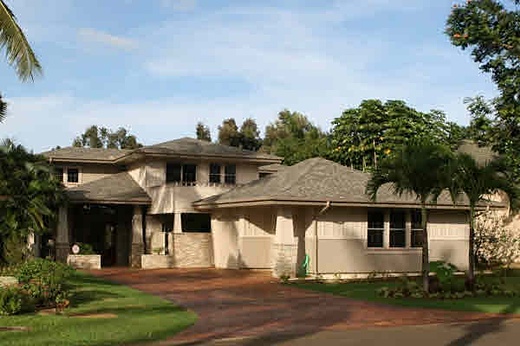SUBHEAD: Although its ten years old this plan still looks forward with some community wisdom.
By Juan Wilson on 2 April 2009 for Island Breath -
(http://islandbreath.blogspot.com/2009/04/kauai-general-plan.html)

Image above: Suburbia delivered to your door. Ad for $2.3-million house in Princeville that reads... "appealing with a mixture of traditional Hawaiian Plantation living and Old World style & craftsmanship". From(http://www.hawaiiinformation.com/Public/SummaryResults.asp?AGENT=64224)
How did it ever get to be that we would be building multi-million-dollar traditional Hawaiian plantation cottages on suburban cul-de-sacs?
It was not the fault of the Kauai General Plan. The Kauai General Plan has been ignored since it was completed in 2000. This is largely because if observed and followed it would have shut down many of the get-rich-quick developments that have laid waste to our island in the last decade. It is likely that the current economic collapse may slow things down enough for us to take a second longer look at this plan. It may need revising, but it was essentially sound.
Maybe now we can follow our own good advice.
The General Plan In Section 1.2 in Chapter One of the 2000 Kauai General Plan its purpose is defined:
Kauai discovered that it's goal was to stay 'rural'.
.
By Juan Wilson on 2 April 2009 for Island Breath -
(http://islandbreath.blogspot.com/2009/04/kauai-general-plan.html)

Image above: Suburbia delivered to your door. Ad for $2.3-million house in Princeville that reads... "appealing with a mixture of traditional Hawaiian Plantation living and Old World style & craftsmanship". From(http://www.hawaiiinformation.com/Public/SummaryResults.asp?AGENT=64224)
How did it ever get to be that we would be building multi-million-dollar traditional Hawaiian plantation cottages on suburban cul-de-sacs?
It was not the fault of the Kauai General Plan. The Kauai General Plan has been ignored since it was completed in 2000. This is largely because if observed and followed it would have shut down many of the get-rich-quick developments that have laid waste to our island in the last decade. It is likely that the current economic collapse may slow things down enough for us to take a second longer look at this plan. It may need revising, but it was essentially sound.
Maybe now we can follow our own good advice.
The General Plan In Section 1.2 in Chapter One of the 2000 Kauai General Plan its purpose is defined:
"The Plan fulfills legal mandates of State law and the Charter of the County of Kauai. More importantly, it provides guidance for land use regulations, the location and character of new development and facilities, and planning for County and State facilities and services." "The General Plan is a direction-setting, policy document. It is not intended to be regulatory in the sense of a zoning code or other land use regulation. The General Plan represents an opportunity to look at the whole island, to think about the future, and make early decisions about issues and opportunities. The specificity of the General Plan depends on the level of agreement that can be reached concerning (a) vision and direction and (b) strategies for achieving the vision."The plan sought to achieve goals of Kauai looking forward twenty years. A vision for Kauai 2020 was developed through a series of community meetings in 1999.
Kauai discovered that it's goal was to stay 'rural'.
"As stated in the Vision, 'rural' describes many aspects of Kauai that people value: lush vegetation; broad expanses of agricultural lands giving wide open vistas; small communities where people know each other; the absence of city noise and lights; not feeling crowded. An essential part of the Vision and one of the driving ideas of the General Plan is to preserve Kauai’s special rural character. Kauai’s rural character lies not just in those lands classified as 'rural' or 'agriculture'. Instead, it lies in how the parts of the island fit together – the relationship of urban settlements to open lands, how the built areas relate to the natural features of the landscape, how people get around."The vision of keeping Kauai rural as was the result of public meetings to determine community values. Section 2.1 of the Plan states:
"The Community Values were formulated by the Citizens Advisory Committee, using input from 25 outreach meetings with a variety of community, business and public interest groups. The statement was revised based on public review and the initial round of Planning District meetings in June 1998."The results of those community meetings and the subsequently developed General Plan were to preserve and enhance the priorities of people of Kauai. The first four priorities of the Vision of Kauai 2020 were as follows:
- Protection, management, and enjoyment of our open spaces, unique natural beauty, rural lifestyle, outdoor recreation and parks.
- Conservation of fishing grounds and other natural resources, so that individuals and families can support themselves through traditional gathering and agricultural activities.
- Access to and along shorelines, waterways and mountains for all. However, access should be controlled where necessary to conserve natural resources and to maintain the quality of public sites for fishing, hunting, recreation and wilderness activities valued by the local community.
- Recognition that our environment IS our economy, our natural capital, the basis of our economic survival and success.
.
No comments :
Post a Comment